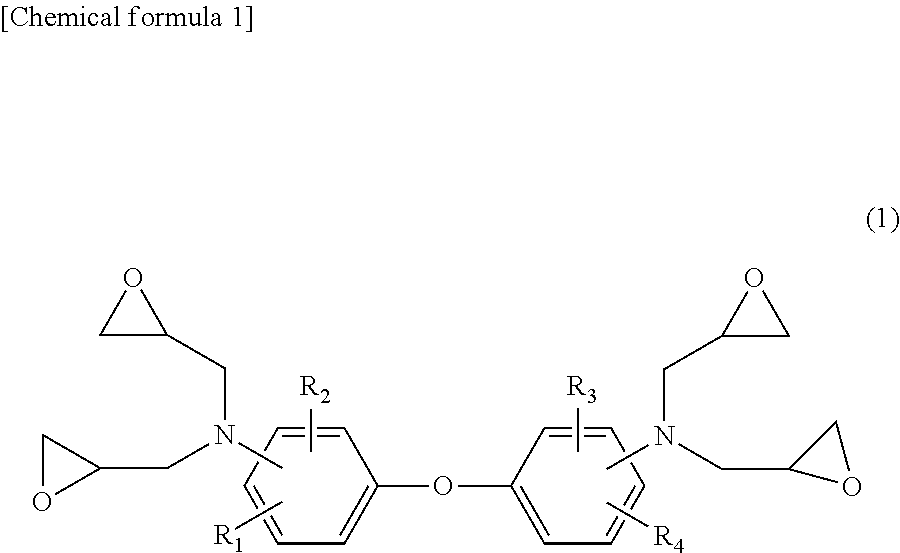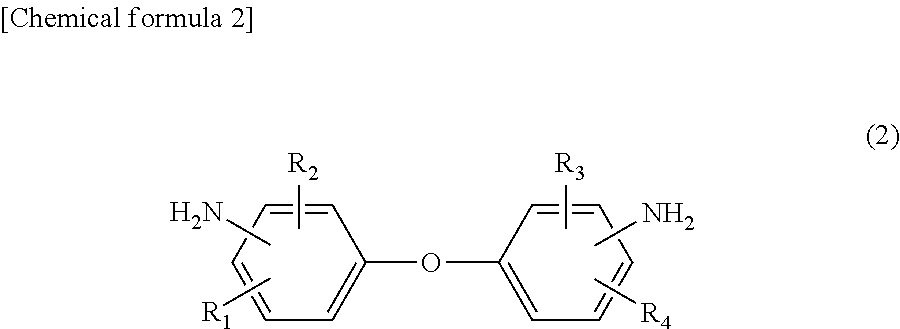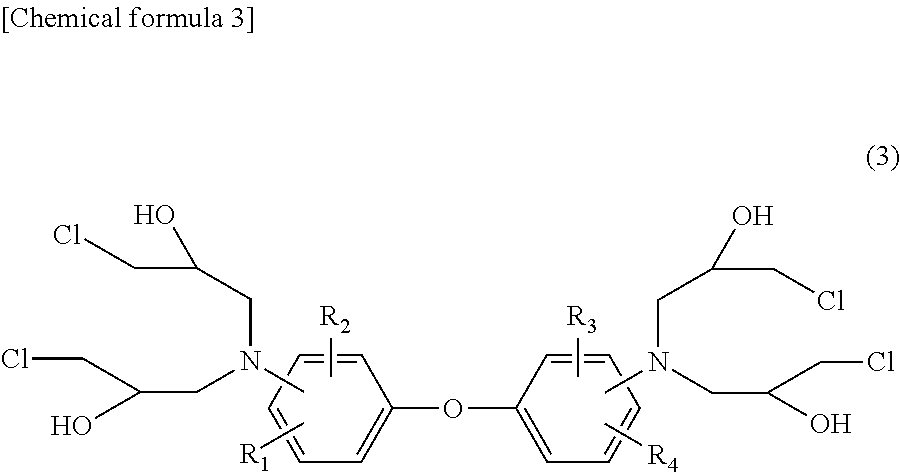Epoxy resin composition for use in a carbon-fiber-reinforced composite material, prepreg, and carbon-fiber-reinforced composite material
a technology of epoxy resin which is applied in the field of epoxy resin composition for use in prepreg, and can solve the problems of poor tensile strength and compressive strength under low temperature conditions, severe properties required for carbon fiber reinforced composite materials, etc., and achieve excellent heat resistance and compressive strength. , excellent in the processability of production
- Summary
- Abstract
- Description
- Claims
- Application Information
AI Technical Summary
Benefits of technology
Problems solved by technology
Method used
Image
Examples
example 1
[0128]A kneader was used to knead 50 parts by mass of 34TGDDE, 30 parts by mass of PxGAN and 20 parts by weight of “Araldite®” MY721 at 160° C. for 2 hours, and the mixture was subsequently cooled to 80° C. Then, 40 parts by mass of SEIKACURE-S were added, and the mixture was kneaded to obtain an epoxy resin composition. Table 1 shows the chemical composition and rates (each number in Table 1 is in parts by mass).
[0129]Releasing paper was coated with the obtained epoxy resin composition by a resin weight per unit area of 50 g / m2 by using a knife coater, to form a resin film. The resin film was overlaid on each of the two sides of carbon fibers (weight per unit area 200 g / m2) paralleled in one direction, and the laminate was heated and pressurized at a temperature of 100° C. and at 1 atmospheric pressure using heat rolls, to impregnate the carbon fibers with the epoxy resin composition, thereby obtaining a prepreg. The volume content of the carbon fibers of the carbon fiber reinforce...
example 6
[0133]A kneader was used to knead 60 parts by mass of 34TGDDE, 40 parts by mass of PxGAN and 10 parts by mass of PES5003P at 160° C., and it was visually confirmed that PES5003P was dissolved. Then, the mixture was cooled to 80° C., and 35 parts by mass of SEIKACURE-S were added. The mixture was kneaded to produce an epoxy resin composition. Table 2 shows the chemical composition and rates (each number in table 2 is in parts by mass).
[0134]Releasing paper was coated with the obtained epoxy resin composition by a resin weight per unit area of 50 g / m2 by using a knife coater, to form a resin film. The resin film was overlaid on each of the two sides of carbon fibers (weight per unit area 200 g / m2) paralleled in one direction, and the laminate was heated and pressurized at a temperature of 100° C. and at 1 atmospheric pressure using heat rolls, to impregnate the carbon fibers with the epoxy resin composition, thereby obtaining a prepreg. The volume content of the carbon fibers in the c...
PUM
| Property | Measurement | Unit |
|---|---|---|
| temperature | aaaaa | aaaaa |
| mass % | aaaaa | aaaaa |
| mass % | aaaaa | aaaaa |
Abstract
Description
Claims
Application Information
 Login to View More
Login to View More - R&D
- Intellectual Property
- Life Sciences
- Materials
- Tech Scout
- Unparalleled Data Quality
- Higher Quality Content
- 60% Fewer Hallucinations
Browse by: Latest US Patents, China's latest patents, Technical Efficacy Thesaurus, Application Domain, Technology Topic, Popular Technical Reports.
© 2025 PatSnap. All rights reserved.Legal|Privacy policy|Modern Slavery Act Transparency Statement|Sitemap|About US| Contact US: help@patsnap.com



